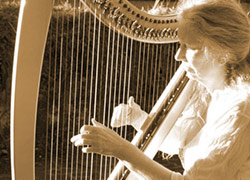


After you have had some lessons you might like to give a performance.
Here are some things you might want to consider before performing for the first time.
1. Get a performance repertoire together
2. Decide on a place to play
3. Let people know you are playing
4. Work out your set list
5. Things to remember on the day
|
|
1. Get a performance repertoire together
To know how many pieces of music you will need - you need to have a timeframe for your performance in mind. Would you like to play 1 or 2 pieces of music or would you like to play somewhere for 1/2 an hour or an hour? You could also approach this the other way. . . if you can only play a few pieces then your performance will be 10 minutes long! If you are in this situation you might like to think about finding a couple of friends who are in a similar situation and you could all play a few pieces each at the same performance. This will help to stretch out the time of the performance and it is also fun working with other musicians.
Once you have decided on how long you will play for you need to find a place to play!

2. Decide on a place to play
Live music is a real treat for people - when we are out and about, esp shopping at a mall etc, we often hear music played through in-house sound systems but what a delight it is when we see people playing live music! People will often stop to listen and look - it is because they love it. Remember that not everyone plays a musical instrument, sometimes musicians can take their music for granted - we can listen to music whenever we want to pick up an instrument and play. This is not the case for a lot of people. The only time they can enjoy live music is when someone else plays for them.
Don't wait for an opportunity to come up - make a concious decision that you are going to play and make it happen! This might mean an email or phone call to a local business or library. A local folk club might have some floor spots available. Another idea is to give a house concert for family and friends.

3. Let people know you are playing
Once you have a performance arranged you need to let people know about it so they can come along. There are all kinds of ways to get information out to people. Social networking sites, txting people on your mobile phone contacts list, sites on the net where you can list a performance, a google search will give you some ideas. Then there are posters and brochures which you may be able to make at home at very little cost.

4. Work out your set list
A set list is very important and will help your performance run smoothly. It is no good to sit at the harp with 20 pieces of music in your book or on your tablet in front of you and looking through thinking ...hmm... which one should I play now... You need a list of the pieces you will play in the correct order and with any notes that you require for that piece that aren't written on your music. It is handy to write the keys beside your titles if you need to change your levers between songs or retune.
The first and the last pieces of music that you play in any set of pieces are the ones most likely to stick in the minds of your audience. Begin and end with pieces you are the most comfortable playing and that you play well. Always have at least one piece of music up your sleeve for an encore.
When you have written up your set list run the whole set from start to finish practising your lever changes or retuning and thinking about introductions for pieces if you will be speaking about them. Know the title and the composer and if you are aware of what the piece was written about let people know. If you are playing a piece or singing a song that you have written yourself talk about what inspired you to write it.

5. Things to remember on the day
Things to take include:
- Your harp - no really! - Don't forget it!
- Harp tuning wrench, and electronic tuner if you use one
- Chair and cushion - legs or stool for the harp, if required
- Music stand and music - light for music stand, if required - If you use a tablet take the charger, and your music book as a backup
- Bottle of water, or other refreshment
- Hand sanitiser
Confidence is very important! Smile and appear confident,
even if you are not - the audience won't know the difference.
Nerves can make you tend to play faster so you may want to pause before you start playing each piece and think about playing slowly and in a relaxed fashion.
Mistakes are over as soon as you make them - forget them as quickly as you can and keep playing. Don't look aghast or you'll only make your mistake more noticeable. Keep your composure and continue on, a mistake only lasts for a couple of seconds and is no big deal.
Turn your mobile phone onto silent.
Most of all enjoy the fact that you are sharing your music with others. It is a wonderful gift!

|


